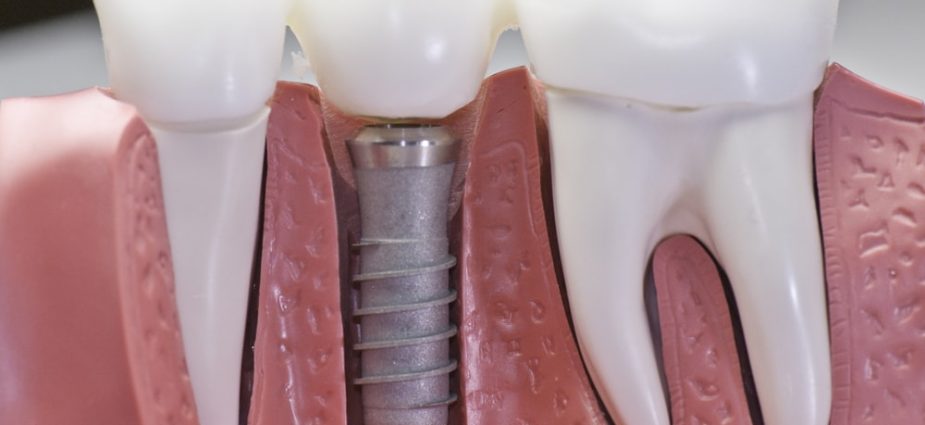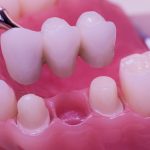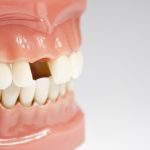Implants vs Bridges
Medically Reviewed by: Dr. Robert A. Milner

When it comes to replacing missing teeth, you’ve got some options. Two popular restorations used to replace missing teeth are dental implants and dental bridges. The question is which option is right for you?
How They Work
A dental implant is basically an artificial tooth root (typically made from titanium) that is anchored in place of a missing tooth. A temporary protective cover screw is placed on the implant while it fuses with the jawbone (a process called osseointegration). This process can take up to six months to complete, but creates an incredibly stable, durable prosthetic. After completed osseointegration, the protective cover is replaced by a temporary crown. This serves as a template around which the gum grows and shapes itself in a natural way. The process is completed when the temporary crown is replaced by a permanent crown.
(Read more about dental implants)
 A dental bridge is in some ways less invasive and other ways more invasive than a dental implant. Unlike implants, bridges do not replace a tooth root. Rather, a bridge uses one or more surrounding teeth as a support on which to attach a crown that can fill the missing tooth space. The treatment process is not nearly as long as the implant process (which requires osseointegration); though in some ways it is more invasive because it requires the permanent alteration of adjacent teeth to support the bridge. As the name implies, a dental bridge literally bridges the gap between teeth resulting from a missing tooth. The restoration therefore must be anchored to one or more adjacent teeth, which must first be filed down in order to function as a support.
A dental bridge is in some ways less invasive and other ways more invasive than a dental implant. Unlike implants, bridges do not replace a tooth root. Rather, a bridge uses one or more surrounding teeth as a support on which to attach a crown that can fill the missing tooth space. The treatment process is not nearly as long as the implant process (which requires osseointegration); though in some ways it is more invasive because it requires the permanent alteration of adjacent teeth to support the bridge. As the name implies, a dental bridge literally bridges the gap between teeth resulting from a missing tooth. The restoration therefore must be anchored to one or more adjacent teeth, which must first be filed down in order to function as a support.
(Read more about dental bridges)
Are you a Candidate?
Dental implants and dental bridges both have certain eligibility requirements that must be met in order to qualify as a candidate. Eligibility is determined during an initial treatment consultation.
Dental implantation must be performed after adolescence when bone growth is complete. X-ray or CT scans will likely be used to evaluate bone density and quality and to determine whether a potential implant patient has enough bone structure for implantation. Smokers will need to quit in order to qualify as a candidate due to the fact that there is a higher rate of implant failure for smokers. Additionally, people suffering from diabetes, cancer or periodontal disease may need additional treatments in order to qualify for implantation.
(Read more about implant candidacy)
Dental bridge candidacy is far less restrictive than dental implant candidacy because of the relatively less invasive nature of the bridge procedure. The primary factor in determining bridge candidacy is the health and stability on the supporting teeth. If you suffer from periodontal disease, tooth decay or have chips or cracks, you may need to undergo additional treatments before the teeth are strong enough to support a dental bridge.
(Read more about bridge candidacy)
The Cost of Implants vs Bridges
Oftentimes cost is ultimately the deciding factor when it comes to selecting a treatment option. And in the case of dental implants vs dental bridges, cost can be deceiving.
Dental implantation is one of the more costly dental treatments, ranging from $900 to $3,000 per implant. Alternatively, a dental bridge may cost significantly less, in the range of $700 to $1,500.
(Keep in mind that the cost of both does not include any additional treatments or therapies that may be required beforehand.)
Considering that dental implants are more restrictive in terms of candidacy, the procedure takes significantly longer to be completed, and they may cost twice as much, you may be asking yourself, why would anyone opt for an implant over a bridge? In one word, the answer is durability.
A dental bridge will likely last between 10 and 20 years before it must be replaced. If cared for properly, an implant can last 40 years or longer.
So an implant might cost you more time and money in the short term, but over the lifetime of your smile, it may actually save you both.
Consumer Guide to Dentistry recommends speaking with a dentist for a complete and thorough evaluation of your unique considerations.
About the Reviewer

Dr. Robert A. Milner is a cosmetic and restorative dentist serving Mission Viejo, CA since 1991 at his private practice, Dentistry For Your Smile. His expertise spans an array of popular treatments including dental implants, full mouth reconstruction, smile makeover, teeth whitening and more. He also works closely with a team of distinguished specialists to cater to a full range of services, including popular orthodontic treatments like Invisalign.
Dr. Milner received his Doctor of Dental Surgery Degree from the Marquette University School of Dentistry, where he graduated head of his class, followed by a two year associateship in Southern California. He is a member of the American Dental Association, the California Dental Association, the Academy of Oral Medicine, the American Academy of Implant Dentistry, and the American Academy of Cosmetic Dentistry.






